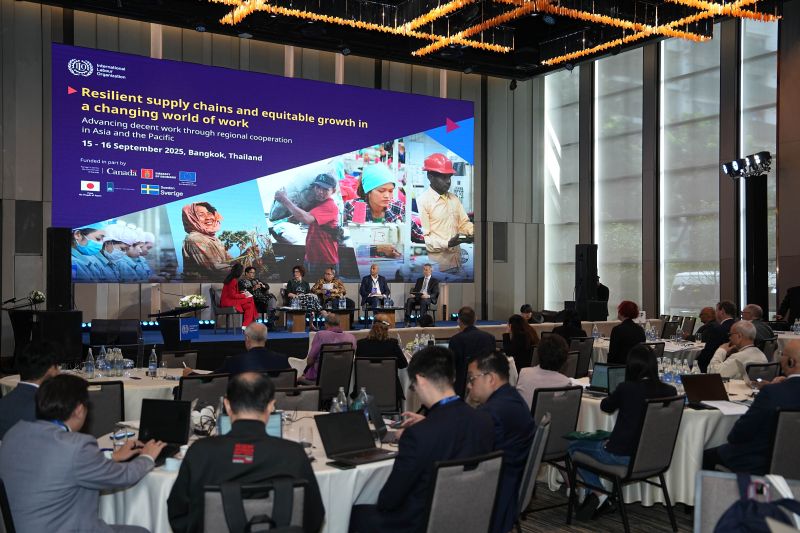Diplomatic Correspondent
Published:2025-09-17 21:41:08 BdST
Bangladesh needs to tackle five priorities to navigate LDC graduation: Lutfey Siddiqi
Chief Adviser’s Special Envoy on International Affairs Lutfey Siddiqi has highlighted five key areas that Bangladesh needs to focus on to effectively address the challenge of LDC graduation, acknowledging that the fact of graduation is unavoidable.
"So, what do we need to do? Acknowledge that the fact of graduation is unavoidable. Even if it is delayed by a couple of years, it does not change our book of work," he said while delivering the keynote speech at the ILO Asia-Pacific Conference on Labour and LDC Issues in Bangkok on Tuesday (16 Sept).
In fact, he said, the changing world-order of aid and tariffs in just the last few months should make it clear that there are fewer unilateral, non-reciprocal, unconditional favours out there.
The envoy said no-one will say: please enjoy these privileges, continue to access their markets, protect their own markets, and do whatever they like with labour, environmental or intellectual property standards.
"The best we can do is to try to ensure a smooth transition as opposed to a sudden, “cliff switch” in our terms of trade," Siddiqi said.
He not only acknowledged but also emphasised the importance of embracing the opportunities that come with graduation.
"Remember, we have sound fundamentals in terms of people and location and we should be attracting considerable investments if we get this right. We are starting with a positive vision, a recipe for reforms, which should quickly move onto a time-bound roadmap of who needs to do what by when," Siddiqi said.
He said they need to diversify exports and this will require more deliberate sales and marketing of existing products and building the capacity to make new products.
The envoy said creation of new products and industries will require new investment, especially foreign investment.
"That in turn will require practical reforms in logistics, customs, ports, inland waterways, airports ... And that will require reforms in public administration - in the way the government operates - including nationwide digital processes that will formulate large parts of the informal sector," he mentioned.
Siddiqi said they have to negotiate free trade agreements or economic partnership agreements with key countries so that they obtain friction-free access to their markets.
Increasingly, he said, these agreements entail multiple chapters, comprehensively covering a wide range of topics beyond tariffs to include labour standards and movement of people.
Siddiqi said skills and training needs urgent focus: targeted training to help workers and entrepreneurs to face competition and meet new demand in specialist areas.
"I was actually in Japan last week partly to help conclude our first ever major FTA/EPA with them, but also to help establish a structured process through which we can send 100,000 skilled workers in targeted vocations over there," the Envoy said.
He said their most important export markets - the European Union for example - will only extend preferential access to their markets (what’s known as GSP Plus) if they explicitly and verifiably upgrade the standards, especially labour standards.
"Conversely, if we can demonstrate credible progress in the advancement of those standards, we are likely to receive a sympathetic ear when we ask for transitional privileges," Siddiqi said.
In a post-uprising Bangladesh, the labour reforms agenda is a moral imperative, he said, adding that Nobel Peace Laureate Professor Muhammad Yunus’ government is committed to promoting dignity and decency in the workplace because that is the right thing to do, consistent with our values and our mandate.
"For the first time in history, we stood up a national-level Labour Reform Commission alongside the fundamental commissions looking at constitutional, parliamentary or judiciary reforms," Siddiqi said.
And these are being taken through a consensus-building process with all political parties ahead of the elections, he said.
The business community supports the government's labour reforms agenda for their own enlightened self-interest: the fact that it has a direct bearing on their access to export markets.
"Sure, we’re nervous about possible risks in execution and implementation. But let’s be clear: negotiating an extension to LDC graduation or negotiating favourable post-LDC terms will not be easy for a song as we have an Article 26 complaint hanging over us at the ILO governing board," Siddiqi said.
"The good news is that we expect to have completed the bulk of our obligations under the roadmap agreed with the ILO: both in terms of legislation and in the conduct of labour relations," he said.
Siddiqi said the three Rs that guide his approach every day. "We have to put rights, relations and resilience at the centre of everything that we do. Please wish us luck!."
Unauthorized use or reproduction of The Finance Today content for commercial purposes is strictly prohibited.


